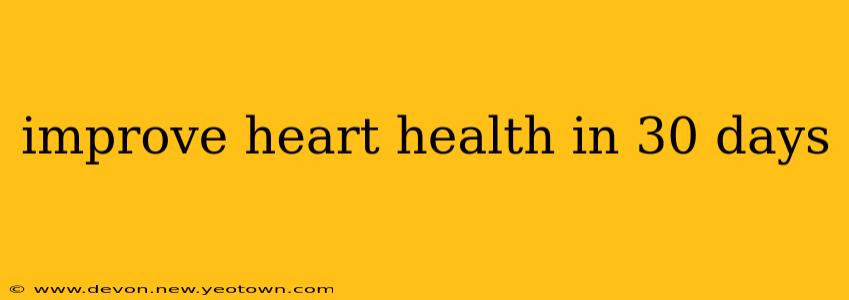The human heart, a tireless engine, works day and night, tirelessly pumping lifeblood throughout our bodies. But like any engine, it needs care and attention to perform optimally. This isn't about a magic bullet; it's about a 30-day commitment to positive changes that will significantly improve your heart health. Think of it as a journey, not a sprint. Let's embark on this path together.
My name is Dr. Evelyn Reed, and I've dedicated my career to preventative cardiology. I've seen firsthand the power of small, consistent changes in transforming heart health. This plan is built on scientifically-backed strategies that are both effective and achievable. Let's dive in!
1. Understanding Your Baseline: The First Crucial Step
Before we embark on this 30-day challenge, it's crucial to understand your current health status. Schedule a check-up with your doctor. This isn't just a formality; it's about building a foundation of knowledge. Your doctor can assess your current risk factors, discuss any existing conditions, and provide personalized guidance tailored to your needs. This initial consultation is the cornerstone of your success.
2. Nutrition: Fueling Your Heart's Engine
What you eat profoundly impacts your heart health. This isn't about drastic diets; it's about making smart, sustainable choices.
What to Eat More Of:
- Fruits and Vegetables: Aim for at least five servings a day. They're packed with vitamins, minerals, and antioxidants that protect your heart.
- Whole Grains: Swap refined grains (white bread, white rice) for whole grains (brown rice, whole-wheat bread). They provide sustained energy and fiber, which helps lower cholesterol.
- Lean Protein: Choose fish (rich in omega-3 fatty acids), chicken, beans, and lentils over red meat.
- Healthy Fats: Incorporate avocados, nuts, and olive oil into your diet. These healthy fats contribute to heart health.
What to Eat Less Of:
- Processed Foods: Limit processed meats, sugary drinks, and packaged snacks high in saturated and trans fats.
- Sodium: Reduce your salt intake to lower blood pressure.
- Sugary Foods and Drinks: Excess sugar contributes to weight gain and increases the risk of heart disease.
3. Exercise: Getting Your Heart Pumping
Regular physical activity is non-negotiable for optimal heart health. Aim for at least 150 minutes of moderate-intensity aerobic exercise per week, spread throughout the week.
What Kind of Exercise?
This could be anything you enjoy – brisk walking, swimming, cycling, dancing. Find activities you genuinely like to ensure consistency.
How Much Exercise?
Start gradually and increase the intensity and duration as you feel more comfortable. Listen to your body, and don't push yourself too hard, especially in the beginning.
4. Stress Management: Protecting Your Heart from Emotional Strain
Chronic stress takes a toll on your heart. Finding healthy ways to manage stress is crucial.
Effective Stress Management Techniques:
- Mindfulness and Meditation: Even 10 minutes a day can make a difference.
- Yoga and Tai Chi: These practices combine physical activity with relaxation techniques.
- Spending Time in Nature: Studies show that spending time outdoors can lower stress levels.
5. Sleep: The Unsung Hero of Heart Health
Adequate sleep is essential for overall health, including heart health. Aim for 7-8 hours of quality sleep each night.
Improving Sleep Hygiene:
- Establish a regular sleep schedule: Go to bed and wake up around the same time each day, even on weekends.
- Create a relaxing bedtime routine: Avoid screens before bed and try a warm bath or reading a book.
- Make sure your bedroom is dark, quiet, and cool.
6. Quit Smoking: A Critical Step for Heart Health
If you smoke, quitting is one of the most significant things you can do to improve your heart health. Seek support from your doctor or a support group. It's challenging, but the rewards are immense.
7. Alcohol Consumption: Moderation is Key
Excessive alcohol consumption increases your risk of heart disease. If you drink alcohol, do so in moderation.
Frequently Asked Questions (FAQs)
Can I improve my heart health in just 30 days?
While significant transformations might take longer, you can definitely make substantial improvements in 30 days by consistently implementing these lifestyle changes. Think of it as laying the foundation for long-term heart health.
What are the best exercises for heart health?
Any aerobic exercise that gets your heart rate up is beneficial. Walking, running, swimming, cycling, and dancing are all excellent choices. Find something you enjoy and can stick with.
How much weight should I lose in 30 days to improve heart health?
Focus on gradual and sustainable weight loss. Aim for 1-2 pounds per week through a combination of diet and exercise. Rapid weight loss can be harmful.
What are the early warning signs of heart disease?
Early warning signs can include chest pain, shortness of breath, dizziness, and fatigue. If you experience any of these symptoms, consult your doctor immediately.
What are the best foods to eat for heart health?
Focus on fruits, vegetables, whole grains, lean protein, and healthy fats. Limit processed foods, saturated and trans fats, and sodium.
This 30-day plan is a starting point. Remember, consistency is key. Small, consistent changes accumulate over time, leading to significant improvements in your heart health. Embrace this journey, celebrate your progress, and remember that you're investing in your most valuable asset – your health. Consult your physician before starting any new diet or exercise program.

